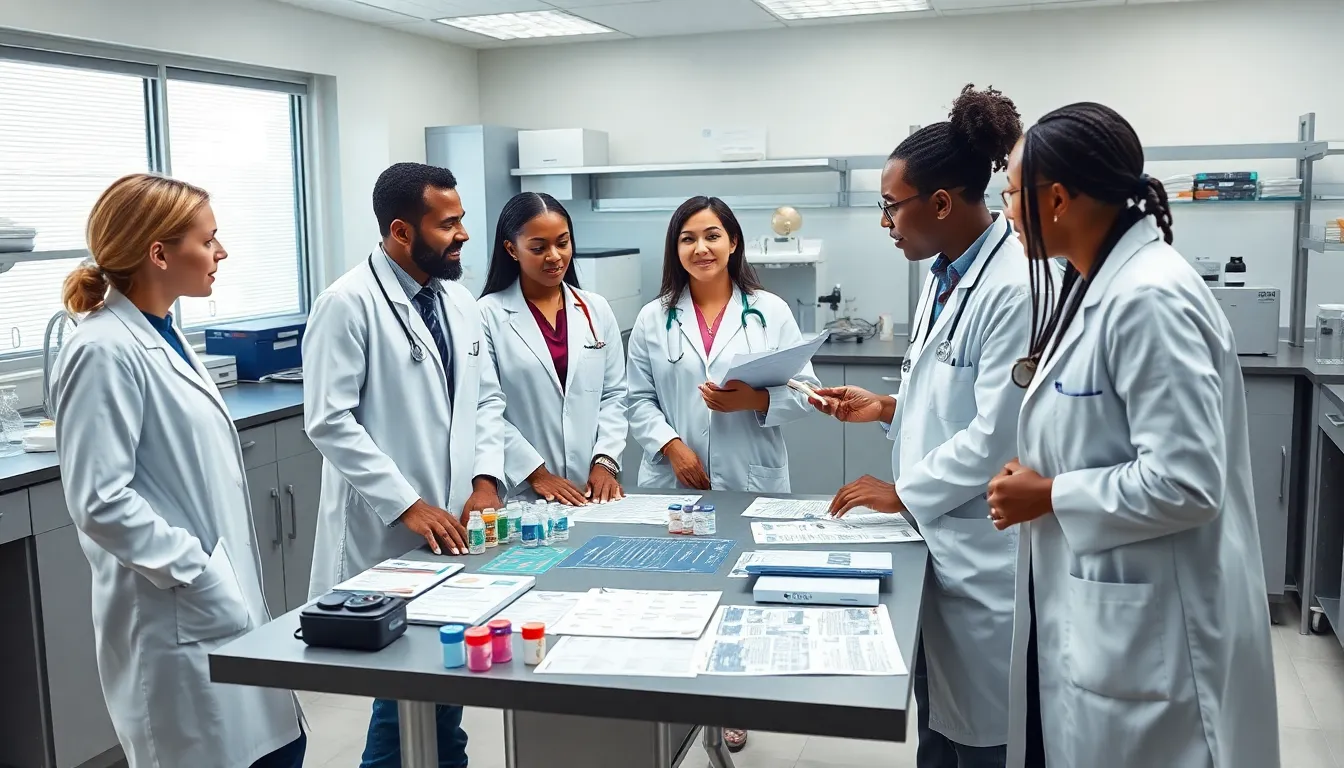Biotechnology is rapidly evolving, shaping the future of healthcare, agriculture, and environmental sustainability. As innovations emerge, they’re revolutionizing how society approaches complex challenges. From gene editing to synthetic biology, these trends are not just buzzwords; they’re paving the way for groundbreaking solutions that enhance quality of life.
In recent years, the integration of artificial intelligence and machine learning into biotech has taken center stage, streamlining research and accelerating product development. Additionally, the rise of personalized medicine is transforming treatment approaches, allowing for tailored therapies that cater to individual patient needs. Staying informed about these trends is crucial for anyone invested in the biotech landscape, as they hold the key to unlocking new possibilities for innovation and growth.
Table of Contents
ToggleCurrent Biotechnology Trends
The biotechnology sector experiences rapid advancements that reshape healthcare, agriculture, and environmental solutions. Key trends focus on gene editing and synthetic biology innovations.
Advancements in Gene Editing
Gene editing technologies, particularly CRISPR-Cas9, play a pivotal role in precision genetics. These techniques enable scientists to make precise alterations to DNA sequences, leading to advancements in disease treatment and agricultural improvements. Recent studies demonstrate CRISPR’s effectiveness in addressing genetic disorders like sickle cell anemia. Furthermore, gene editing enhances crop resilience against pests and climate change, supporting food security.
Innovations in Synthetic Biology
Synthetic biology combines biology and engineering principles to design and construct new biological parts. The field is making significant strides in creating biofuels and bioplastics, offering sustainable alternatives to fossil fuels and traditional plastics. Companies like Ginkgo Bioworks utilize synthetic biology to produce custom microbes for various industries. Additionally, synthetic biology contributes to vaccine development, as seen in mRNA vaccines used during the COVID-19 pandemic, showcasing rapid response capabilities to emerging health threats.
Impact on Healthcare

Biotechnology significantly transforms healthcare through innovative approaches and tailored treatments. Key advancements include personalized medicine and biopharmaceutical developments that enhance patient outcomes.
Personalized Medicine
Personalized medicine tailors treatment based on individual genetic profiles, lifestyle, and environmental factors. This approach improves the effectiveness of therapies for conditions like cancer, where specific genetic mutations drive tumor growth. Examples include targeted therapies that precisely inhibit cancer cell proliferation and immunotherapies that enhance the immune response against tumors. The rise of genomic sequencing technologies has facilitated the identification of biomarkers, enabling healthcare providers to offer customized treatment plans that increase success rates and minimize adverse effects.
Biopharmaceutical Developments
Biopharmaceutical developments expand treatment options and improve the efficacy of therapies. Innovations like monoclonal antibodies and therapeutic proteins target specific disease pathways. For instance, monoclonal antibodies have shown efficacy in treating diseases such as rheumatoid arthritis and various cancers. The evolution of biologics, including mRNA technology, resulted in groundbreaking vaccines that demonstrate rapid response capabilities. The agile production methods of biopharmaceuticals enable quicker adaptation to emerging health threats, significantly impacting public health response.
Environmental Applications
Biotechnology plays a crucial role in environmental sustainability, offering innovative solutions for challenges such as pollution, resource management, and climate change. Recent advancements highlight significant trends in sustainable agriculture practices and bioremediation techniques.
Sustainable Agriculture Practices
Sustainable agriculture practices benefit from biotechnological advancements, enhancing food security while minimizing environmental impact. Genetic modifications improve crop resistance to pests and diseases, reducing reliance on chemical pesticides. Additionally, biotech innovations enable the development of drought-resistant crops, critical in arid regions. Examples include genetically engineered versions of maize and wheat that require less water and withstand extreme weather conditions. Furthermore, biotechnology facilitates soil health management through biofertilizers that promote nutrient efficiency, lowering the input of synthetic fertilizers.
Bioremediation Techniques
Bioremediation techniques utilize microorganisms to clean up contaminated environments, exemplifying biotechnology’s contribution to environmental protection. Specific bacteria and fungi are engineered to degrade pollutants such as heavy metals, hydrocarbons, and pesticides. For instance, certain strains of Pseudomonas have been optimized to break down crude oil spills effectively. Advances in genomic techniques allow for the isolation and enhancement of microbial strains with superior biodegradation capabilities. This environmentally friendly approach not only restores polluted sites but also reduces the cost and ecological footprint associated with traditional cleanup methods.
Emerging Technologies
Emerging technologies are at the forefront of biotechnology, driving innovation and shaping future applications across various sectors.
Artificial Intelligence in Biotechnology
Artificial intelligence (AI) enhances data analysis and decision-making in biotechnology. AI algorithms process vast datasets, identifying patterns and correlations that accelerate research. For instance, AI models assist in predicting protein structures, leading to advancements in drug discovery. Additionally, AI-driven tools optimize clinical trials, improving participant selection and overall efficiency. Companies like Insilico Medicine leverage AI for drug development, significantly reducing timelines from years to months.
CRISPR and Beyond
CRISPR technology revolutionizes gene editing with its precision and efficiency. Researchers utilize CRISPR-Cas9 to modify DNA sequences, which has shown promise in treating genetic disorders such as cystic fibrosis and muscular dystrophy. The technology extends to agriculture, where it aids in developing crops resistant to diseases and environmental stresses. Beyond CRISPR-Cas9, advanced techniques like CRISPR-Cas12 enhance editing capabilities, offering reduced off-target effects. Companies like Editas Medicine and Caribou Biosciences pioneer these innovations, propelling the field of genetic engineering into new territories.
Biotechnology continues to reshape various sectors with its innovative approaches and technologies. The focus on gene editing, personalized medicine, and sustainable practices is paving the way for a future where healthcare and environmental challenges can be addressed more effectively. As artificial intelligence and machine learning become integral to research and development, the potential for accelerated advancements grows exponentially.
Staying updated on these trends is essential for professionals in the biotech field. Embracing these innovations not only fosters growth but also enhances the ability to tackle pressing global issues. The future of biotechnology holds promise for those ready to navigate its evolving landscape.



